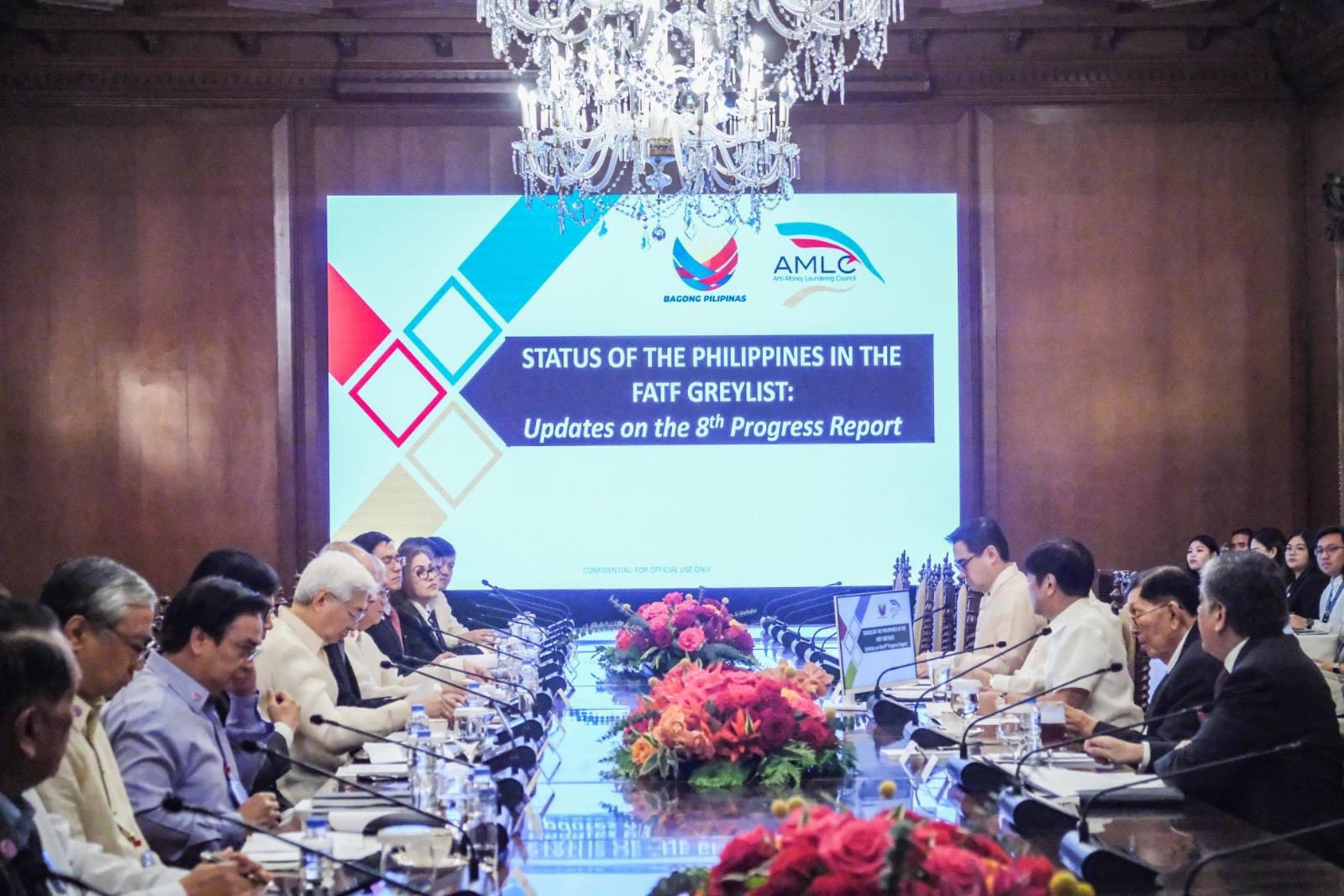OFW remittance flow may be hampered if PH is in FATF black list —AMLC
By Raymund Antonio and Raymund Antonio
Increased cost, more stringent requirements, and riskier disapprovals are awaiting the remittances of overseas Filipino workers (OFWs) if the Philippines is blacklisted by the Financial Action Task Force (FATF), a global anti-money laundering task force, the country’s Anti-Money Laundering Council (AMLC) said on Tuesday, Jan. 2.
 President Ferdinand ‘Bongbong’ Marcos Jr. presides over a sectoral meeting on the status of the Philippines in the Financial Action Task Force (FATF) gray list held in Malacañang on Tuesday, Jan. 2, 2024. (Yummie Dingding/ PPA Pool)
President Ferdinand ‘Bongbong’ Marcos Jr. presides over a sectoral meeting on the status of the Philippines in the Financial Action Task Force (FATF) gray list held in Malacañang on Tuesday, Jan. 2, 2024. (Yummie Dingding/ PPA Pool)
In a Palace press briefing after a sectoral meeting with President Marcos, AMLC Secretariat Executive Director and lawyer Matthew David explained the repercussions of being in the FATF’s black list. Right now, the Philippines is in its gray list, or under increased monitoring.
“There are repercussions for being on the gray list because the longer we are on the gray list, the bigger the possibility or the higher the risk that we will enter the blacklist. Of course, we don’t want to be in the blacklisted jurisdiction,” he said.
“And if we will be on the blacklisted list, there are repercussions to that and one of the repercussions is the effect on our transactions of our OFWs,” he added.
According to the official, the FATF may imposed several “countermeasures”—namely, increase in cost, more requirements, stringent requirements, or sometimes, transactions may be denied or disapproved—on OFW remittances and international financial transactions of Filipinos abroad if the Philippines enter the task force’s black list.
“We do not want that to happen, so all government agencies are aiming to address those deficiencies, eight remaining action item plans, and eventually exit the gray list this year, 2024,” David stressed.
He also said during the press briefing that the Philippines has set a “self-imposed deadline” of January 2024 to exit the gray list after it failed to do so in January of last year.
Marcos, during the meeting, reiterated the government’s “high-level political commitment” to exit the FATF’s gray list.
The FATF’s black and gray lists identify jurisdictions with weak measures to combat money laundering and terrorism financing.
The Philippines remains under the gray list, which means it is actively working with FATF to address strategic deficiencies in their systems. Countries under the gray list are in increased monitoring, reflecting its commitment to swiftly resolve its identified strategic deficiencies.
Some countries with the Philippines in the gray list are Vietnam, United Arab Emirates, Syria, Turkiye, Yemen, and Croatia, among others, while those in the black list are Iran, North Korea, and Myanmar, among others.
The AMLC official expounded that countries and jurisdictions under the black list are eyed by the FATF as having “several strategic deficiencies” in their Anti-Money Laundering/Counter Terrorism Financing (AML/CTF) system.
“That’s why they given us a recommended actions; if we don’t complete or address our strategic deficiencies, we will eventually enter the blacklist,” he said.
David revealed that the Philippines originally has 18 recommended action plans since June 2021. So far, the government must still address eight remaining items in the action plan.
Once a country is in the black list, the FATF-imposed countermeasures will “kick in” and “the jurisdictions within the FATF will be expected to conduct enhance due diligence over the financial transaction” of that country’s nationals and anyone linked to the country.
Aside from the President and David, also present during the meeting were Executive Secretary Lucas Bersamin, Special Assistant to the President Antonio Lagdameo Jr., Trade Secretary Alfredo Pascual, Finance Secretary Benjamin Diokno, Interior Secretary Benhur Abalos, Cagayan Economic Zone Authority (CEZA) Administrator Katrina Ponce Enrile, Foreign Affairs Undersecretary Charles Jose, Presidential Adviser on Investment and Economic Affairs Frederick Go, and other officials from the Securities and Exchange Commission (SEC), Bangko Sentral ng Pilipinas (BSP), National Intelligence Coordinating Agency (NICA), Aurora Pacific Economic Zone and Freeport Authority (APECO), Philippine Drug Enforcement Agency (PDEA), and the intelligence community, among others.